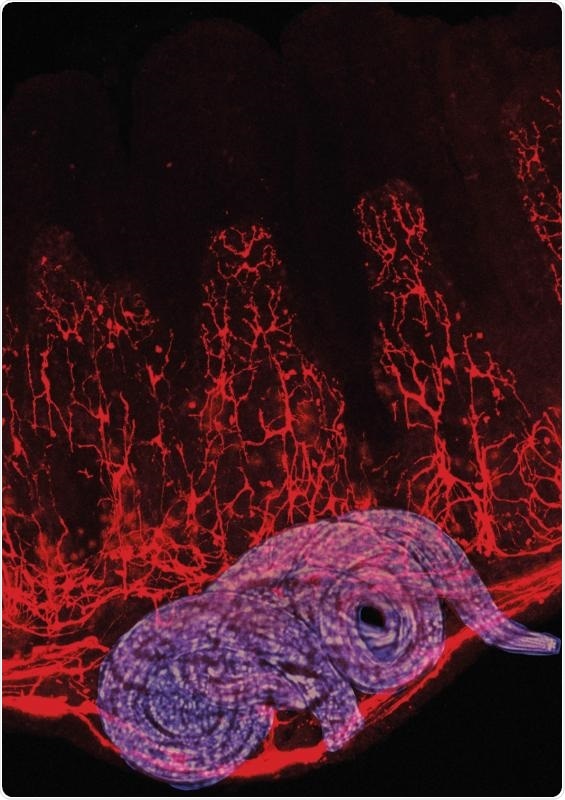Scientists from the Francis Crick Institute unraveled a basic role of glial cells in the nervous system of the gut in retaining a healthy intestine. These cells are identified to coordinate the immune responses of the gut succeeding pathogen invasion and can be major targets when examining novel treatments for inflammatory bowel conditions.

Image showing a cross-section through a mouse gut showing enteric glial cells (red) and the parasite H. polygyrus (blue). Image Credit: The Francis Crick Institute.
Retaining a healthy intestine and repairing tissue after infection or other kinds of injury is a complex mechanism. If this process goes wrong, it can result in inflammatory bowel diseases, like colitis and Crohn’s disease. Earlier studies in this area concentrated on the activity of various immune cells, and many mysteries on the processes behind these diseases are yet unknown, indicating that other cells might carry out a crucial role.
The scientists analyzed the role of enteric glial cells in response to tissue damage. These cells are found within the gut wall and are part of the enteric nervous system, which regulates the contractions of intestinal muscles and various aspects of digestive function. The research was published on October 20th, 2021, in the Nature journal.
The researchers infected mice with a common roundworm parasite, Heligmosomoides polygyrus, and discovered that when the parasite attacks the gut wall, a protein, named interferon-gamma, is rapidly released by immune cells. Even though this protein was considered to target cells of the immune system, the current research revealed that among its first target is the nearby glial cells.
The protein activates these cells, which later release signals that draw other immune cells to the place of damage to combat infection.
To determine if such processes take place in humans, the scientists examined data of colon samples gathered earlier by others from individuals with ulcerative colitis—a lasting condition where the colon and rectum are inflamed, causing stomach cramps and severe diarrhea.
Identical to the mouse cells, genes linked to interferon-gamma were activated in the human glial cells. This shows that glial cells in the human gut are also involved in inflammatory conditions of this organ.
Sadly, currently treatments for inflammatory bowel disease are often limited to alleviating the symptoms, rather than tackling the cause. Our insights into the importance of enteric glial cells in maintaining a healthy intestine open the door to further studies into how these cells work and interact with the immune system and in the future could help us develop potential new treatments for these conditions.”
Fränze Progatzky, Study Author and Postdoctoral Scientist, Development and Homeostasis of the Nervous System Laboratory, Francis Crick Institute
The researchers also analyzed the role of glial cells in retaining healthy intestinal gut tissues, in the absence of infection. They hindered the capability of enteric glial cells to be activated by interferon-gamma and discovered that this resulted in tissue inflammation even in normal mice. This reveals that the cells are also crucial, beyond injury or disease, in retaining healthy intestinal tissue.
Glial cells are present in many organs, and so it’s possible they also play similar roles in maintaining healthy tissue and mounting appropriate responses to pathogens or toxins in other parts of the body. It will be exciting to explore this possibility further.”
Vassilis Pachnis, Study Author and Group Leader, Development and Homeostasis of the Nervous System Laboratory, Francis Crick Institute
Source:
Journal reference:
Progatzky, F., et al. (2021) Regulation of intestinal immunity and tissue repair by enteric glia. Nature. doi.org/10.1038/s41586-021-04006-z.